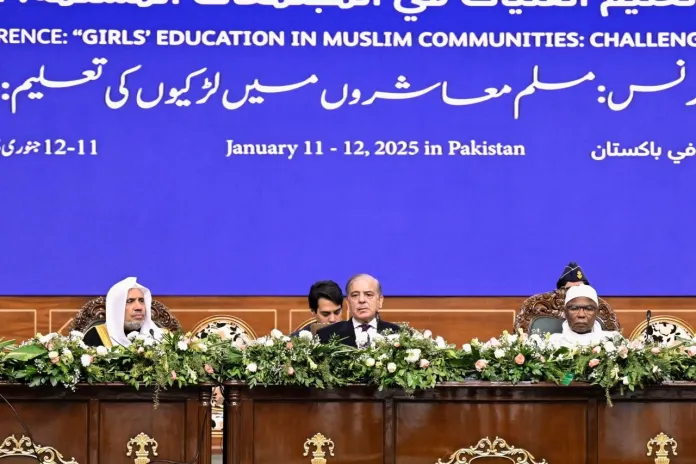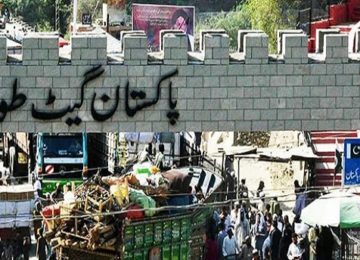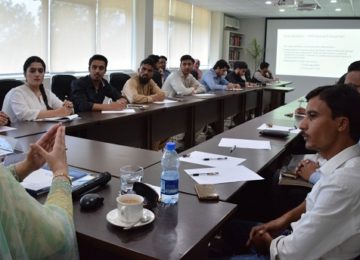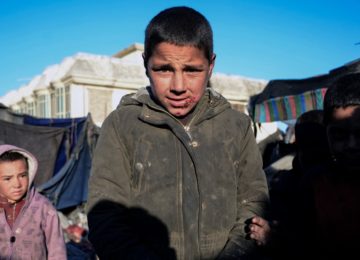By ELSA IMDAD
The OIC Conference on Girls’ Education in Islamabad brought together global leaders and advocates to confront the dire educational exclusion faced by Afghan girls under the Taliban’s regime, highlighting the need for urgent, collective action.
The Taliban’s systematic denial of education to Afghan girls and women is a profound violation of human rights and Islamic principles. Since their return to power in 2021, their policies have instituted a regime of educational apartheid, making Afghanistan the only member state of the Organization of Islamic Cooperation (OIC) to bar women from secondary schools and universities. Framed under cultural and religious justifications, these regressive measures outrightly contradict Islamic teachings, which emphasize the pursuit of knowledge as a divine obligation for all. The exclusion of Afghan women from education threatens not only their individual futures but also the stability and progress of Afghan society as a whole.
The International Conference on Girls’ Education in Muslim Communities: Challenges and Opportunities, held in Islamabad in January 2025, convened political leaders, education experts, and religious scholars to tackle this urgent issue. Over 150 delegates from 47 countries participated, culminating in the adoption of the Islamabad Declaration, a landmark document outlining actionable strategies to dismantle barriers to girls’ education across Muslim-majority societies. While the conference addressed global challenges, Afghanistan’s plight stood as the most pressing example of educational exclusion and its devastating consequences.
Afghanistan’s crisis reflects a broader failure to protect women’s rights in the region. Since the Taliban’s resurgence, Afghan women have faced sweeping restrictions that have erased their participation in public life. These measures have not only barred them from educational institutions but have also excluded them from the workforce, fostering dependence and vulnerability. The Taliban’s justification, claiming to preserve cultural values and adhere to Islamic law, grossly misrepresents Sharia. Historically, Muslim societies have championed education for both genders, with scholars universally acknowledging the pursuit of knowledge as a shared religious duty. By distorting these principles, the Taliban’s policies have entrenched patriarchal control at the expense of societal progress.
The Islamabad Declaration provides a comprehensive framework to address the crisis in Afghanistan and other systemic barriers to girls’ education in Muslim-majority countries. Key resolutions include:
- Education as a Religious and Human Right: The declaration reaffirms that education is both a divine command and a fundamental human right. Literacy, particularly among women, is essential for societal development and stability.
- Alternative Education Pathways: Recognizing the immediate challenges in Afghanistan, the declaration emphasizes scholarships, online platforms, and community-driven initiatives as critical measures to provide Afghan girls with access to education.
- Resource Mobilization: Delegates called for increased funding and strengthened partnerships with international organizations to ensure equitable access to education for all girls, particularly in conflict-affected areas.
- Digital and Inclusive Education: Developing digital learning platforms and creating inclusive environments for girls with special needs were highlighted as priorities to bridge educational gaps.
- Religious Advocacy: Scholars and religious leaders were urged to actively counter extremist narratives that misuse Islamic teachings to justify educational exclusion.
The conference, attended by prominent global leaders and activists, underscored the urgency of collective action. Notable participants included OIC Secretary General Hissein Brahim Taha, Muslim World League Secretary General Mohammad bin Abdul Karim Al-Isa, and Pakistan’s Senate Chairman Yousaf Raza Gilani. Notable woman participants included Nobel laureate Malala Yousafzai, former Norwegian prime minister Kjell Bondevik, head of UN Assistance Mission in Afghanistan (Unama) Roza Otunbayeva, UK’s Baroness Sayeeda Warsi, Dr Gulnara Janiyeva from Uzbekistan’s Centre for Islamic Civilisation, and others.
The absence of Taliban representatives, despite formal invitations, highlighted their refusal to engage in meaningful dialogue on education and human rights, further isolating them from global discourse.
While Afghanistan exemplifies the most extreme case of gender-based educational exclusion, systemic barriers persist in other Muslim-majority countries. Poverty, entrenched cultural norms, and inadequate infrastructure hinder millions of girls from accessing education. The Islamabad Declaration calls for holistic solutions, including legislative reforms, gender-sensitive policies, and grassroots advocacy. Education is not only a moral imperative but also a strategic necessity for societal cohesion and economic progress.
Research consistently demonstrates that educating women leads to healthier families, stronger economies, and more stable societies. Educated women are more likely to participate in the workforce, contribute to community development, and advocate for their rights. Denying education to Afghan girls, therefore, represents a profound loss—not only for them but for the nation as a whole. As Senate Chairman Gilani aptly remarked, “The future of any society lies in the education of its youth, particularly girls. We cannot build a prosperous future if we leave half of our population behind.” He urged governments, civil society, and international partners to collaborate in creating an environment where girls were encouraged, supported, and empowered to pursue their education.
Malala Yousafzai urged Muslim leaders to advocate for gender apartheid to be classified as a crime under international law and to oppose the Taliban’s oppressive treatment of women and girls in Afghanistan. She stressed that Muslim voices should lead the fight against the Taliban, who have barred girls from secondary schools and women from universities, warning that an entire generation of girls in Afghanistan is being robbed of its future. Malala condemned the Taliban’s actions as cultural and religious justifications for human rights violations, calling on Muslim leaders to speak out and show true leadership aligned with Islam.
The absence of the Taliban from this critical dialogue is indeed a serious setback—not only for Afghanistan but for the Taliban itself. By choosing isolation over engagement, they have forfeited an invaluable opportunity to present their narrative, address international concerns, and collaborate on solutions that could benefit their own people. This absence underscores a tragic disconnect between their policies and the aspirations of the Afghan people, particularly women and girls, who stand to lose the most.
At this juncture, it is essential for the global community—scholars, policymakers, activists, and concerned citizens—to continue to raise their voices and demand action. The situation in Afghanistan requires not only international attention but sustained pressure to initiate change. Solidarity and collective action are crucial in challenging the status quo, restoring the right to education, and safeguarding the fundamental rights of Afghan women and girls. Only through concerted, cross-border efforts can the international community hope to influence an environment where justice, equality, and stability are not just aspirational but achievable.
SOURCE: https://matrixmag.com/oic-conference-on-girls-education-is-there-hope-for-afghanistan/
AUTHOR

Elsa Imdad is a USG Alumna. She holds a bachelors in modern languages with an English major and Spanish minor. She has previously been part of American Spaces in Pakistan and now works as a Project Coordinator at the Center for Research and Security Studies. She is also a weekly contributor for Matrix. Her interests include public diplomacy, language teaching, peace and conflict resolution, capacity building for marginalized groups, etc.








